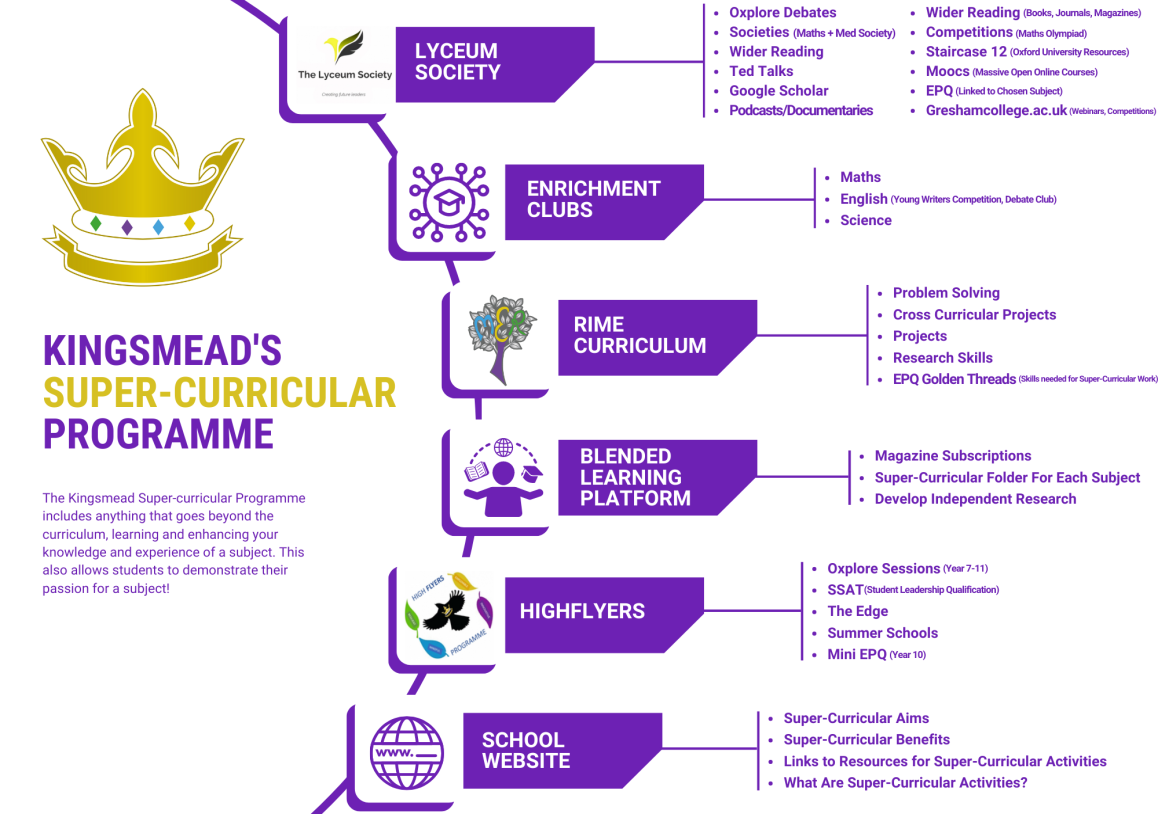Academic Excellence
Super-Curricular Activities
Super curricular activities will have an impact and significance for all students, but especially those applying to highly competitive universities such as Oxford, Cambridge, and the other Russell Group Universities. When applying to study at university, admissions tutors will want to see students’ passion for the subject they are applying for. They do this by looking at students’ super-curricular activities. These are activities that take students beyond the A-Level curriculum in the subject they are planning to study, beyond what school subject teachers are teaching, demonstrating a passion for their chosen subject.
The range of super-curricular activities is huge; with the internet, students have plenty of opportunity to go that extra mile and show their passion for the subject they are planning to study at university. Above all, super-curricular activity must be something the student is interested in and thought of as building a case to support the student’s university application.
At Kingsmead we recognise the importance of students having opportunities to carry out super-curricular activities before they start sixth form to support and prepare them for their future studies. With this in mind, super curricular activities are drip fed throughout Year 7-11 to gently ease students into this mindset. This occurs through our RIME curriculum, Highflyer’s and Enrichment Programme. Subjects also have resources for wider reading, watching and listening on the Blended Learning Platform that students can access at any time to carry out independent Super curricular work and develop their passion for learning beyond the curriculum.
Top tips for Super Curricular activities: -
· Exploring your subject is not about filling your head with facts!
· Be open minded - try things that are different to what you’re used to
· Find connections - look for links in between different things that you have explored
· Think actively and ask questions, don’t just accept the arguments that you come across
· Pause and reflect – while reading articles or listening to podcasts, stop to think, what is your opinion?
· And remember to follow your interests. Don’t do an activity just because you think it looks good!
Below are some links to super curricular activities to explore: -
Remember to choose a subject that Is linked to your chosen university subject, as this will add strength to your university application! If you have not yet decided on your university course, please use the below as a starting point to help you.
Staircase 12
Staircase 12 is hosted by Oxford University and has a wealth of an online resources and information with lots of ideas to help students extend their knowledge beyond the school syllabus.
https://www.univ.ox.ac.uk/applying-to-univ/staircase12/
Oxplore
Created by Oxford University, Oxplore aims to engage young people in debates and ideas that go beyond the classroom. A wide range of subjects are covered, from archeology to zoology, and linked to the latest research being carried out at Oxford.
https://oxplore.org/
Gresham College
The College offers students the chance to listen to and engage with pre-recorded webinars and live talks on a variety of subjects. Each talk is given by specialists in their chosen field.
https://www.gresham.ac.uk/
My HE Plus
My HE Plus is hosted by Cambridge University. The website aims to give students the opportunity to explore different subjects beyond the school curriculum. Each subject section has been put together by Cambridge postgraduate students and academics who are at the cutting edge of research in their field. As well as guided activities, there are questions to think about and suggestions for further reading.
http://www.myheplus.com/
https://www.undergraduate.study.cam.ac.uk/files/publications/super-curricular_suggestions.pdf
Ted Talks
TED talks.
Most students are familiar with TED talks and they are a great source of inspiring talks from leading experts. A good place to start are ted talks recommended by students for students.
https://blog.ed.ted.com/2017/03/16/9-ted-talks-recommended-by-students-for-students/ or https://www.weareteachers.com/ted-talks-students/
Edge Magazine
Edge Magazine is an online resource that brings together leading thinkers in their fields and within broad subject areas – mind, life, culture, universe and technology. It contains videos and audio resources.
https://www.edge.org/
Isaac Physics
Isaac Physics Is described as a Department of Education project at the University of Cambridge. It aims to give students transitioning from GCSEs to Sixth Form and university, insight into and understanding of Physics by problem solving. A-Level resources range from problem solving, mentoring schemes to extension resources (includes a section on maths questions to help prepare for a STEM course interview).
https://isaacphysics.org/alevel
MOOCs – online courses
MOOCs is short for Massive Open Online Courses that are mostly free. The range of online courses available is huge, from those that may be related to the subject being studied at university level to those that help develop soft skills. By selecting courses carefully, students can show a passion for their subject at university level:
EdX (https://www.edx.org) has a wide selection of courses, ranging from science to languages and law. EdX was founded by Harvard University and MIT (Massachusetts Institute of Technology)
Alison (https://alison.com/courses) offers a range of courses, from art to humanities
Coursera (https://www.coursera.org/) has a range of courses and works in partnership with top universities and organisations to offer courses online. Courses range from an Introduction to Engineering Mechanics to Introduction to Mathematical Thinking, and more.
Wider Reading
Students are advised to read around the subject they plan to study and keep up to date with developments in their subject of choice. This can be through journals or through books written by experts in their areas of interest, or documentaries. A starting point may be to look up university research/areas of development/projects, which can be found on individual university websites.
Work Experience
Students are advised to gain work experience relevant to their chosen field of study. This will not only give students an insight into their preferred subject/career, but will enable them to make an informed choice and it shows a level of commitment to the degree subject they are planning to study.
Click here for super curricular resources from Kings College Cambridge.

